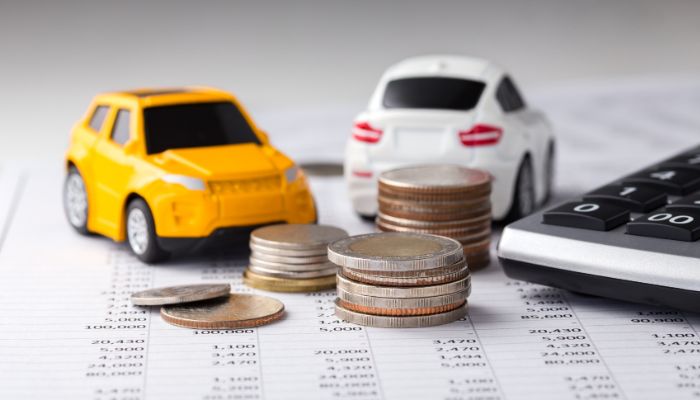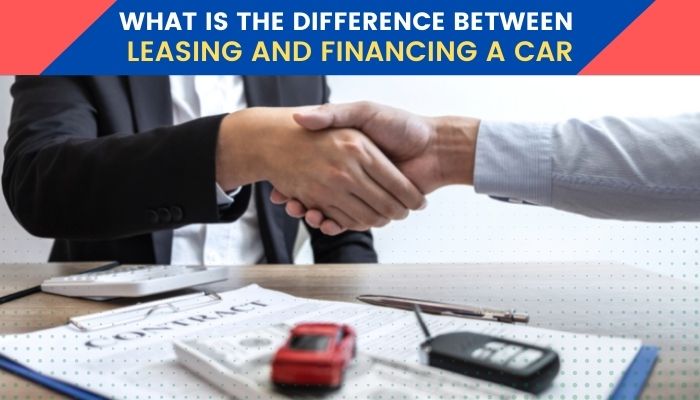Can You Lease A Car With Bad Credit?
When you have poor credit or no credit, leasing a car can be difficult. Most leasing companies mandate credit checks on their clients. The purpose of a credit check is to establish if you can reliably make the monthly payments on your car lease.
However, some leasing companies hardly use credit scores as criteria for approving or declining a car lease. Instead, they evaluate your ability to make monthly payments and use your credit rating to determine how much you will pay.
Can you lease a car with bad credit? Yes. You are likely to get approved for a car lease with bad credit but at higher monthly payments, thanks to your standing as a risky borrower. That’s why you should go for cheaper, used cars, instead of brand-new ones
This article discusses everything you should know about leasing a car with bad credit and no money down. Keep reading for more information.
How Does Leasing a Car Work?
Leasing and purchasing a car with an auto loan are two completely different things. Even though the two involve monthly payments, a car lease is cheaper and lasts for a shorter time. Typically, a leasing contract lasts for 36 months.
For a car lease, the lender bases the monthly payments on the vehicle’s expected depreciation – the difference between the vehicle’s current value and its value when the lease ends plus fees and interest. The lease agreement covers the following:
- Manufacturer’s Suggested Retail Price (MSRP): From its name, this is the price set by the manufacturer for individuals and organizations wishing to purchase brand-new vehicles in cash. That’s unlikely to be a factor when leasing a car with bad credit.
- Down Payment: Some leasing companies may ask for a down payment at the start of the lease. It is usually the equivalent of one monthly installment or more. A down payment can convince the leasing company to grant you the lease when leasing a car with bad credit.
- Lease Period: A lessee and the leasing company must focus on the period the lease will last. Typically, lease periods last up to 36 months.
- Residual Value: At the end of the lease, the car would have depreciated up to a specific value. That’s the car’s residual value or the price you will pay if you wish to purchase the vehicle on the expiry of the lease.
- Capitalized Cost: Capitalized cost is the lease price, which you divide by the number of months to get the monthly payments. It will help if you negotiate this cost aggressively.
- Money Factor: There is an interest rate attached to every car lease contract. The manufacturer sets the interest rate or money factor for brand-new cars. With bad credit, you are at the mercy of the leasing company.
- Termination Fees: If you return the car before the end of the lease period, the leasing company is likely to demand a termination fee. You will know just how much it is before signing the lease agreement.
- Mileage Limit: Every car lease comes with a mileage limit, referring to the number of annual miles you can drive the car. On average, most car leasing companies have their mileage limit between 10,000 and 15,000 miles.
- Disposition Fee: Leasing companies require lessees to pay a disposition fee at the end of the lease to cover the cost of preparing the car for sale. You can either negotiate the fee upfront or upon returning the vehicle.
Apart from the terms listed above, leasing companies often define what they consider to be excess wear and tear. If you return the car in bad shape, the company will charge you a penalty to cover the required repairs.
The leasing company will also state its action when you default on your monthly lease payments. As restrictive as these rules might seem, they ensure the successful execution of the lease. At the end of the defined duration, you should return the vehicle in good condition.
How to Lease a Car?
Leasing a car is not difficult, especially if you know what to do. Here are two steps you can take:
Check Your Budget
Once you are sure you want to lease the car, decide the amount you can afford to spend each month. Lease payments are often less expensive compared to equivalent monthly payments for car purchases.
You can afford an excellent model with bad credit car leasing. If you want to buy the car at the end of your lease, try saving up during the lease period to buy it when your lease is up.
You should as well consider the monthly insurance costs if you have never owned a vehicle before. Car insurance is a must-have necessity if you want to drive a car. You should have a valid insurance policy to get on the road.
Monthly insurance premiums vary depending on many factors. Among them include where you live, gender, and your credit score. Always sample insurance quotes from various companies to get an idea of what you should pay before getting a lease.
Select Your Car, Negotiate and Apply
With a predetermined budget and insurance policy rates in mind, you should visit the car dealership to check the various vehicles available for lease. Most leasing dealerships sell cars after lease; thus, only the new models are available for lease.
Since leasing is confusing, ensure that you consult widely with a salesperson for assistance. Shop for a vehicle to lease the same way you would shop when buying a car. Take it for a test drive, check its features, comfort, fuel efficiency, and more. Don’t be afraid to check various dealerships before choosing the car.
If you have found your preferred car, negotiate the leasing terms with the dealership. Ensure that you haggle everything from monthly lease payments, additional fees, and dealer charges during the negotiations. Ask for possible fee reductions, waivers, and discounts. You can check multiple dealers until you find one that works for you.
Dealers will often ask for financial information, bank statements, or employment history to ascertain that you can afford the lease payments. Based on this, the dealer can change the terms of the offer or cancel the deal, especially if you have bad or no credit.
Established dealers can offer no credit check car lease deals. Knowing your credit score is important before visiting the dealer to avoid such embarrassing surprises.
Can You Lease a Car with Bad Credit?
Having understood the prerequisite steps of leasing, can you lease a car with bad credit? It is possible to hire a car with bad credit. Note that it can be difficult to source funding and a good lease deal.
Dealerships often limit their lease deals to reduce the risks of financial loss. You will undoubtedly get a lease, but you will have to make a substantial down payment and incur high monthly charges compared to those with a higher score.
As a rule of thumb, lease dealerships lease vehicles to individuals with excellent or above-average scores. If you have bad credit, you should take some time to improve your credit score to find a better lease deal.
Even if your score is in the excellent range, find options of bettering it to access low down payments, low-interest rates, and better lease deals.
What Credit Score is Required to Lease a Car?
As mentioned, some dealers will have to check your credit score to lease a car as part of the process. Low credit scores get less favorable terms. Besides, low scores attract high down payments. So, what is the minimum required credit score required to lease a car? There is no specific number as the number varies depending on the lender.
Nonetheless, most auto leasing companies prefer FICO scores from 700 and above. That falls solidly within the FICO ranks of good credit. FICO scores below 579 are considered poor, 580 to 669 are fair, 670 to 739 are good, 740 to 799 are very good, while those with 800 and above are considered excellent.
A credit score ranging between poor and fair may give you a tough time securing a lease deal. A clear understanding of the leasing process and how the credit score influences the lease will ease the process.
How to Improve Lease Approval Chances Before Applying?
To improve your chances of being approved for a lease with bad credit, observe the tips below.
Make a Down Payment
Paying some money–the capitalized cost or cap-cost reduction when signing a lease deal can increase your chances of being approved for a lease. You should save some money to make a large down payment before applying for the lease.
That lowers the amount of your lease, monthly payments and increases the chances of being approved. Note that most leasing companies have restriction guidelines on the possible cap-cost reduction payment.
Reduce Your Debt to Income Ratio
The debt to income ratio is a calculation of your monthly debt payments and your monthly gross income. Lenders consider a low debt to income ratio a positive approval factor for those applying for a car lease with bad credits.
Have a Co-Signer
If you have poor credit, request a family member or friend with a good credit score to co-sign your car lease. That provides undoubted reassurance to the leasing company that you will submit monthly payments without delay. Always remember that failing to pay puts the co-signer on the hook.
How Does Leasing Affect Your Credit Score?
Leasing impacts your credit score in several ways. Like any other type of financing, the payment history has a significant effect on your credit. With timely repayments over time, you will notice a substantial improvement in your credit score. If you miss or delay making payments, your credit score suffers.
Calculation of credit scores includes all the amount of money owed, including leases. Fortunately, a lease is considered an installment loan with a fixed repayment period, better than revolving credits.
As you continue making lease payments, your credit score improves since it lessens the amount owed. Whereas leasing can help rebuild your credit score over time, you will experience a slight dip in the score when you first take the lease.
How to Improve Credit Score Before Leasing?
If you think leasing is right for you but have bad credit, you should prepare beforehand. Below are some easy credit-building steps to improve your score.
Have a Credit Monitoring Service
Credit errors are a common phenomenon in financial institutions. Using a credit monitoring service will help identify theft cases by providing alerts on new items included in your credit report.
That helps prevent any damage from fraud before it leaves severe damage to your credit score. You should sign up with a credit monitoring service such as privacy guard, credit karma, identity force, and identity guard, among others, before working on your credit score to track the progress.
Use Credit Builder Loans
As the name suggests, credit builder loans are small, low-interest personal loans that help people improve their credit scores. The institutions offer lump-sum payments you can for anything.
You should then pay back the loan in monthly installments with slight interest. The loan provider reports on-time payments to major credit reporting bureaus, consequently raising your credit score.
These loans are an excellent way to prove that you can manage credit repayments and add diversity to your credit portfolio. When opting for this, take a small, manageable loan that you can pay back before applying for the lease.
Make Payments on Time
Payment history is an essential factor when making a credit score calculation. Submitting your credit card loan and other payments on time is a proven method of improving your credit score. Always check your minimum payment dates for all outstanding accounts and submit the payments on time.
Alternative Options of Getting a Car with Bad Credit
If you have been turned down for a car lease or are unsure if leasing is a good option, below are some possible alternatives to leasing with bad credit. Some could be pricey, and your credit history can still be an obstacle, but it is worth considering as you find options to boost your credit score.
Find Buy Here Pay Here Dealers
BHPH dealers are independent used or second-hand car dealers who provide auto-financing options instead of financing companies or banks. Typically, they cater to customers looking to drive but with bad credits and those recovering from bankruptcy.
BHPH loans are expensive and charge high-interest rates compared to conventional loans. They also show less leniency compared to traditional lenders. A missed payment, for instance, can lead to car repossession without warning.
Find Lease Transfers
Also known as lease swaps, you can quickly be approved to take over another person’s lease agreement. You will be responsible for making all the remaining payments and fulfilling original lease conditions in such a case.
Leasing companies often check the driver’s credit history taking over the lease but with less stringent requirements. Sites like LeaseTrader and SwapAlease can ease your search for lease-transfer opportunities.
Purchase a Less Expensive Used Car
Going for a low-priced car typically reduces the amount required to finance the vehicle. That lowers the interest and fees payable. Though it depends on various factors, qualifying for used-car auto loans is easier with lousy credit than leasing with bad credit.
The Bottom Line
Well, from the guide above, can you lease a car with bad credit? A perfect answer to this lies in your dealer and how bad your credit score is. Note that you can still hire a car with bad credit, especially taking advantage of the several ways that you can leverage to lessen your financial burden.
Always fetch for dealerships with departments focused on people with less than stellar credits. Even though you get lease approval, you will likely incur high-interest rates. If you can wait, take the necessary steps to rebuild your credit score before lease shopping.
Frequently Asked Questions (FAQ)
What credit score do you need to lease a car with no money down?
Typically, leasing companies accept credit scores of at least 620. Anything below that is subprime and might not qualify you for a lease. Between 620 and 679, you have a near-ideal credit rating. Once you go above 680, you can attract some desirable offers from the leasing companies.
Can I get a lease with bad credit?
Yes. You can lease a car with bad credit. However, it can be difficult because some dealerships use credit scores to limit the number of lessees and risk losing finances. Of course, you will get a lease but require a higher down payment and high monthly payments.
Can you lease a car without putting anything down?
Yes. You can lease a car with or without a down payment, especially if you have good credit. But that would mean having to make high monthly payments. That’s not impossible with bad credit, but bad-credit leasing companies usually require lessees to put some money down.
Is it dumb to put money down on a car lease?
Not all car lease companies would require you to make an initial down payment before leasing a car. So, you don’t have to pay a down payment. If you make a down payment and the car gets involved in an accident within the first month, you will end up losing your money.





